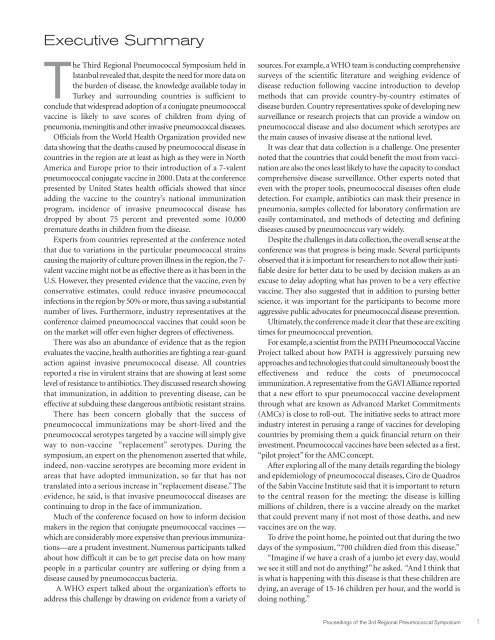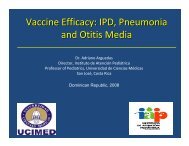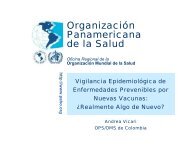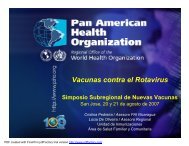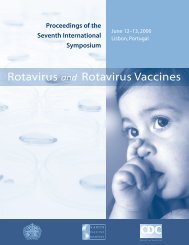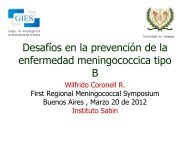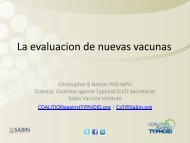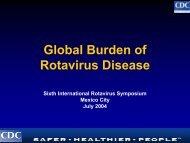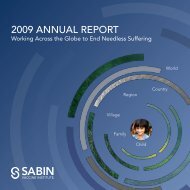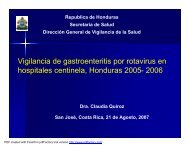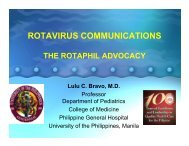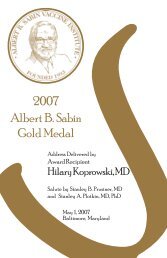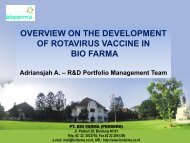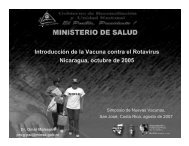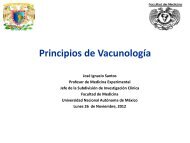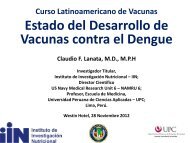3rd Pneumococcal Symposium web - Sabin Vaccine Institute
3rd Pneumococcal Symposium web - Sabin Vaccine Institute
3rd Pneumococcal Symposium web - Sabin Vaccine Institute
Create successful ePaper yourself
Turn your PDF publications into a flip-book with our unique Google optimized e-Paper software.
Executive Summary<br />
The Third Regional <strong>Pneumococcal</strong> <strong>Symposium</strong> held in<br />
Istanbul revealed that, despite the need for more data on<br />
the burden of disease, the knowledge available today in<br />
Turkey and surrounding countries is sufficient to<br />
conclude that widespread adoption of a conjugate pneumococcal<br />
vaccine is likely to save scores of children from dying of<br />
pneumonia, meningitis and other invasive pneumococcal diseases.<br />
Officials from the World Health Organization provided new<br />
data showing that the deaths caused by pneumococcal disease in<br />
countries in the region are at least as high as they were in North<br />
America and Europe prior to their introduction of a 7-valent<br />
pneumococcal conjugate vaccine in 2000. Data at the conference<br />
presented by United States health officials showed that since<br />
adding the vaccine to the country’s national immunization<br />
program, incidence of invasive pneumococcal disease has<br />
dropped by about 75 percent and prevented some 10,000<br />
premature deaths in children from the disease.<br />
Experts from countries represented at the conference noted<br />
that due to variations in the particular pneumococcal strains<br />
causing the majority of culture proven illness in the region, the 7-<br />
valent vaccine might not be as effective there as it has been in the<br />
U.S. However, they presented evidence that the vaccine, even by<br />
conservative estimates, could reduce invasive pneumococcal<br />
infections in the region by 50% or more, thus saving a substantial<br />
number of lives. Furthermore, industry representatives at the<br />
conference claimed pneumococcal vaccines that could soon be<br />
on the market will offer even higher degrees of effectiveness.<br />
There was also an abundance of evidence that as the region<br />
evaluates the vaccine, health authorities are fighting a rear-guard<br />
action against invasive pneumococcal disease. All countries<br />
reported a rise in virulent strains that are showing at least some<br />
level of resistance to antibiotics. They discussed research showing<br />
that immunization, in addition to preventing disease, can be<br />
effective at subduing these dangerous antibiotic resistant strains.<br />
There has been concern globally that the success of<br />
pneumococcal immunizations may be short-lived and the<br />
pneumococcal serotypes targeted by a vaccine will simply give<br />
way to non-vaccine “replacement” serotypes. During the<br />
symposium, an expert on the phenomenon asserted that while,<br />
indeed, non-vaccine serotypes are becoming more evident in<br />
areas that have adopted immunization, so far that has not<br />
translated into a serious increase in “replacement disease.” The<br />
evidence, he said, is that invasive pneumococcal diseases are<br />
continuing to drop in the face of immunization.<br />
Much of the conference focused on how to inform decision<br />
makers in the region that conjugate pneumococcal vaccines —<br />
which are considerably more expensive than previous immunizations—are<br />
a prudent investment. Numerous participants talked<br />
about how difficult it can be to get precise data on how many<br />
people in a particular country are suffering or dying from a<br />
disease caused by pneumococcus bacteria.<br />
A WHO expert talked about the organization’s efforts to<br />
address this challenge by drawing on evidence from a variety of<br />
sources. For example, a WHO team is conducting comprehensive<br />
surveys of the scientific literature and weighing evidence of<br />
disease reduction following vaccine introduction to develop<br />
methods that can provide country-by-country estimates of<br />
disease burden. Country representatives spoke of developing new<br />
surveillance or research projects that can provide a window on<br />
pneumococcal disease and also document which serotypes are<br />
the main causes of invasive disease at the national level.<br />
It was clear that data collection is a challenge. One presenter<br />
noted that the countries that could benefit the most from vaccination<br />
are also the ones least likely to have the capacity to conduct<br />
comprehensive disease surveillance. Other experts noted that<br />
even with the proper tools, pneumococcal diseases often elude<br />
detection. For example, antibiotics can mask their presence in<br />
pneumonia, samples collected for laboratory confirmation are<br />
easily contaminated, and methods of detecting and defining<br />
diseases caused by pneumococcus vary widely.<br />
Despite the challenges in data collection, the overall sense at the<br />
conference was that progress is being made. Several participants<br />
observed that it is important for researchers to not allow their justifiable<br />
desire for better data to be used by decision makers as an<br />
excuse to delay adopting what has proven to be a very effective<br />
vaccine. They also suggested that in addition to pursing better<br />
science, it was important for the participants to become more<br />
aggressive public advocates for pneumococcal disease prevention.<br />
Ultimately, the conference made it clear that these are exciting<br />
times for pneumococcal prevention.<br />
For example, a scientist from the PATH <strong>Pneumococcal</strong> <strong>Vaccine</strong><br />
Project talked about how PATH is aggressively pursuing new<br />
approaches and technologies that could simultaneously boost the<br />
effectiveness and reduce the costs of pneumococcal<br />
immunization. A representative from the GAVI Alliance reported<br />
that a new effort to spur pneumococcal vaccine development<br />
through what are known as Advanced Market Commitments<br />
(AMCs) is close to roll-out. The initiative seeks to attract more<br />
industry interest in perusing a range of vaccines for developing<br />
countries by promising them a quick financial return on their<br />
investment. <strong>Pneumococcal</strong> vaccines have been selected as a first,<br />
“pilot project” for the AMC concept.<br />
After exploring all of the many details regarding the biology<br />
and epidemiology of pneumococcal diseases, Ciro de Quadros<br />
of the <strong>Sabin</strong> <strong>Vaccine</strong> <strong>Institute</strong> said that it is important to return<br />
to the central reason for the meeting: the disease is killing<br />
millions of children, there is a vaccine already on the market<br />
that could prevent many if not most of those deaths, and new<br />
vaccines are on the way.<br />
To drive the point home, he pointed out that during the two<br />
days of the symposium, “700 children died from this disease.”<br />
“Imagine if we have a crash of a jumbo jet every day, would<br />
we see it still and not do anything?” he asked. “And I think that<br />
is what is happening with this disease is that these children are<br />
dying, an average of 15-16 children per hour, and the world is<br />
doing nothing.”<br />
Proceedings of the <strong>3rd</strong> Regional <strong>Pneumococcal</strong> <strong>Symposium</strong> 1


